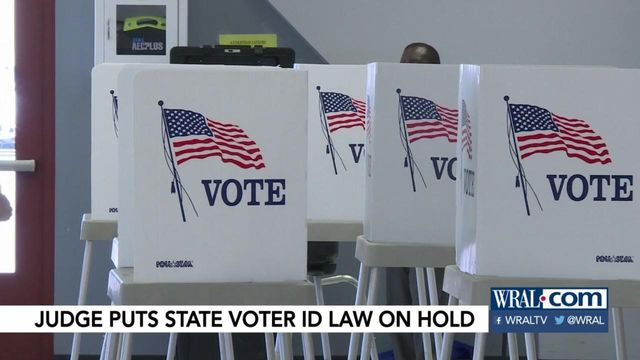Federal judge blocks voter ID in North Carolina
As promised last week, U.S. District Judge Loretta Biggs blocks North Carolina's new voter ID law for the 2020 elections "unless otherwise ordered by the court."
Posted — UpdatedU.S. District Judge Loretta Biggs' preliminary injunction means North Carolina can't require photo ID at the polls in the coming elections without further notice from the court. A full trial on the state's voter ID law is planned in the coming months, but for now, it's up to Attorney General Josh Stein whether and how to fight the judge's order.
Stein's spokeswoman would only say Tuesday that the Attorney General's Office was reviewing the 60-page order. Republican leaders who authored the law have called on Stein, a Democrat, to defend it vigorously. Stein had opposed the preliminary injunction and argued in court filings that the law "does not deny, abridge, or significantly burden any voter’s right to vote."
The injunction won't just block voter ID, but other changes lawmakers made in 2018 to loosen the state's ballot challenge rules. Biggs declined to block a third element the NAACP asked her to enjoin, which expands the number of poll watchers allowed at precincts on Election Day.
These changes were all part of Senate Bill 824, which fleshed out an amendment North Carolina voters approved in November 2018, adding a voter ID requirement to the state constitution. Biggs said she looked to recent North Carolina history to decide that the bill was likely "imbued with discriminatory intent."
Biggs rejected an NAACP argument that Senate Bill 824 is a “barely disguised duplicate" of House Bill 589, a much broader and more restrictive elections bill with voter ID requirements that lawmakers passed in 2013. The federal courts shot down that law in 2016, saying it targeted African-American voters "with almost surgical precision."
But most of the same Republicans who were in power when the first bill passed were in power when the second one passed, Biggs wrote.
"Further, those legislators were elected, at least in part, by way of district maps which were declared unconstitutional," Biggs wrote, referencing court decisions that tossed North Carolina's legislative maps as racial, and then as partisan, gerrymanders.
"[A]fter voters ratified the voter-ID amendment, S.B. 824 was enacted along (virtually) strict party lines and over the Governor’s veto," she wrote. "These sequential facts constitute evidence that S.B. 824 was motivated by discriminatory intent."
Biggs acknowledged that lawmakers didn't pull racial voting data as they considered the second bill, something she considered a "smoking gun" that helped doom the 2013 law. But "the legislators who previously used racial data to target minority voters with 'surgical precision' must have understood S.B. 824’s potential to affect a disparate impact," she wrote.
The judge was unmoved by defense arguments that the bill would have been enacted without race as a motivating factor, saying the continuing lack of evidence of in-person voter fraud in North Carolina, the kind requiring photo ID at the polls would prevent, "casts doubt on the sincerity (if not the facial legitimacy) of the fraud and confidence justifications."
She also rejected arguments that the bill was passed with bipartisan support. Three Democrats, two of whom had already lost their seats to primary opponents, voted for the bill.
"The Court is doubtful that the minimal aisle-crossing that took place during S.B. 824’s passage should carry any significant weight," Biggs wrote.
Biggs said that the bill's lone Democratic sponsor, Sen. Joel Ford, D-Mecklenburg, admitted in a deposition that he considered switching parties around the time the bill was drafted.
Reached by telephone Tuesday evening, Ford said he's still a Democrat and noted that he and two other Senate Democrats sponsored legislation similar to the bill in question in 2013. Ford, who like Biggs is black, said he didn't see discriminatory intent in the new law.
"No," he said. "When I looked at the legislation, I asked myself, if my grandmother was still alive, would she be able to vote under this legislation, and the answer is yes. How is it discriminatory when the photo ID is free?"
The law makes IDs available for free from state Division of Motor Vehicles offices and county boards of election. The NAACP argued that lack of transportation and the inability to take off work or set aside family commitments still create barriers that are more likely to impact black and Latino voters.
Ford said the law was a good opportunity to get people something they need for day-to-day life and that voter ID has become needlessly hyper-partisan.
"I really think people who argue against photo ID are doing people who don't have photo ID a disservice when you need photo ID just to get around in our state," he said. "It really blows my mind that you would not want to see people who don't have ID to get one for free."
Related Topics
• Credits
Copyright 2025 by Capitol Broadcasting Company. All rights reserved. This material may not be published, broadcast, rewritten or redistributed.






